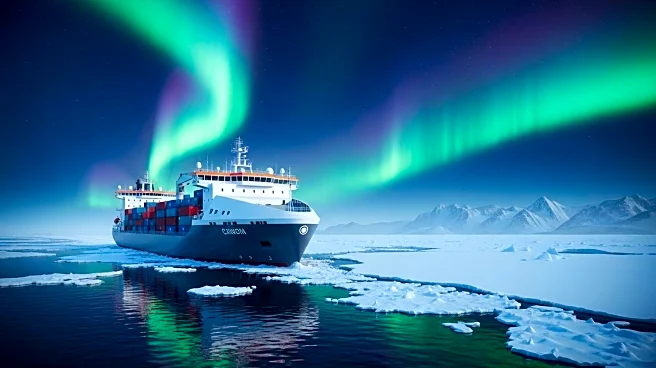What's Happening?
The world's first China-Europe Arctic Express has been launched by Ningbo-Zhoushan Port, marking a significant step in China's 'Polar Silk Road' initiative. The container vessel Istanbul Bridge departed from Beiyi Container Terminal, heading for Felixstowe, the UK's largest container port. The ship carries over 1,000 containers and is navigating the Northeast Passage, which is expected to cut shipping time to 18 days, less than half the duration of the traditional Suez Canal route. The vessel is operated by Sea Legend, a Chinese-invested shipping company.
Why It's Important?
The launch of the 'Polar Silk Road' represents a strategic shift in global shipping routes, potentially reducing transit times and costs for goods between China and Europe. This development could enhance trade efficiency and competitiveness, benefiting industries reliant on timely deliveries. The Arctic route's shorter duration may also reduce fuel consumption and emissions, aligning with global sustainability goals. However, the initiative raises geopolitical considerations, as Arctic shipping routes become more accessible due to climate change, impacting international relations and environmental policies.
What's Next?
As the 'Polar Silk Road' gains traction, other shipping companies may explore Arctic routes, potentially reshaping global trade patterns. The initiative could prompt discussions on international regulations and environmental protections in the Arctic region. Stakeholders, including governments and environmental groups, may engage in dialogue to address the implications of increased Arctic shipping activity. The success of this maiden voyage could lead to further investments in Arctic infrastructure and technology, supporting the expansion of the 'Polar Silk Road'.
Beyond the Headlines
The 'Polar Silk Road' highlights the intersection of economic interests and environmental concerns in the Arctic. As shipping routes open due to melting ice, the region faces challenges related to ecosystem preservation and indigenous rights. The initiative underscores the need for balanced approaches that consider both economic benefits and environmental stewardship. The geopolitical dynamics of Arctic shipping may influence international policies and collaborations, shaping the future of global trade and environmental governance.









